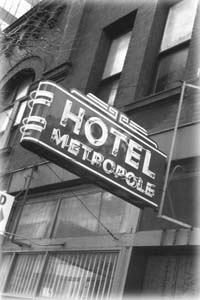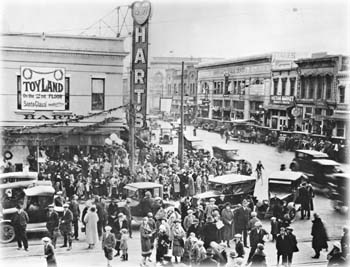![[Metroactive News&Issues]](/gifs/news468.gif)
![[Metroactive News&Issues]](/gifs/news468.gif)
[ Metro | Metroactive Central | Archives ]
Heartbreak Hotel
Photo by Christopher Gardner
The Hotel Metropole once seemed destined for the wrecking ball. Then a private developer stepped in and taught Redevelopment that history has economic value and the market rules now.
By Michael Learmonth
ON THE CORNER of South Market and Post, in the midst of San Jose's adolescent downtown, the Hotel Metropole stands with the shabby elegance of an old man who wears a suit and tie to feed the pigeons or play checkers at the park. The handmade red bricks, Romanesque facade, arched windows, quirky round portholes and deco neon sign seem to scold the surrounding glass monoliths for their youth and self-importance. They, after all, have only seen one boomtown. The old hotel has seen two.
This year, the Metropole will quietly commemorate its 100th birthday. Or maybe it's next year. No one is really certain. But one thing is for sure: The old hotel, after decades of neglect, is back in the limelight and ready to teach everyone a lesson. Despite the noble intentions of Redevelopment and a spate of other developers, it looks as if the old man will have it his way, on his terms, and he isn't interested in taking any handouts.
WHEN THE SAN JOSE Redevelopment Agency began to take an interest in buying and renovating the old hotel late last year, the powers that be were in no rush to make a deal. The structure (originally named the Alcantara Building when it was built by San Jose pioneer Pedro de Saisset) was designated a historic landmark by the City Council in 1989, scaring away potential developers for almost a decade. Because no significant land had been purchased in downtown San Jose for 12 years without agency involvement, the agency thought it was just a matter of time before the owners of the block came to the agency, hat in hand, for financial help for developing the historic Metropole. They thought wrong.
While the agency slept, several prospective buyers made offers on the entire block containing the old hotel. Two weeks ago, South Market Street Partners accepted a $4 million offer from Rose Ventures for most of the property, and Rose is about to close escrow on the Hotel Metropole, consolidating its holdings on the block. Stung to be left out of such a major deal, last week Redevelopment Agency negotiators met with representatives of Rose Ventures, South Market Street Partners and Mark Ritchie, the real estate broker representing buyer and seller. The agency expressed its desire to buy the Hotel Metropole and put it back into service as the new home for the San Jose Metropolitan Chamber of Commerce. Rose Ventures said no thanks, it had its own plans for the old hotel, leaving agency officials to contemplate a future where public money is no longer the linchpin of downtown development in San Jose.
Inconveniently situated in the middle of downtown's high-rise blocks, the Metropole holds historic ground.
IN COMMERCIAL HANDS, the Hotel Metropole faces a future as office space to accommodate a boom that has pushed rents close to $3 a square foot. But the hotel was built for San Jose's last boom, when Italian immigrants and other newcomers arrived in droves at the turn of the century to work in Santa Clara Valley's bustling agricultural economy. After it opened in 1902, the Hotel Metropole took its place among other small hotels on the block, providing modest accommodations for new arrivals to the valley. Those who lived above San Jose's storefronts during the day were largely shopkeepers themselves and skilled tradesman. A 1924 photo of the block shows the Hotel Metropole as a bookend to a bustling block filled with Christmas shoppers, fedoras and Model-T Fords.
Then the Great Depression hit downtown San Jose, leading to middle-class flight to the growing suburbs. The Metropole's neighborhood took a dive as San Jose's business district migrated to South First Street. The old hotel became a flophouse until the city condemned the upstairs of the building after the 1989 Loma Prieta quake, and the last $380-per-month tenants were evicted in 1994.
Jack Douglas is a retired historian who worked at the SJSU library and wrote the book Historical Footnotes of Santa Clara Valley.
Douglas remembers the Hotel Metropole as it was when he arrived in San Jose in the '50s: "It has always been a sort of second-rate hotel for transients, the kind of thing you wouldn't notice." David Boone, the real estate developer who owned the property in the late '80s, argued against historic designation for the hotel, playing up its low-rent reputation as an embarrassment to the de Saisset legacy: "To associate him with that is an affront to his family's good name." Boone and former San Jose Councilmember David Goglio developed the 15-story Gold Building, also on Market Street, before their relationship fell apart in a flurry of creditors' lawsuits.
In making his case against landmark status for the Metropole in 1989, Boone cited the "structural infirmities" of the building. He also wrote a letter to the council arguing that preservation was "impractical from a cost perspective" and offered to photograph the building for historic purposes before demolition. The Redevelopment Agency joined the chorus of Metropole detractors as, at the time agency officials were eager to charm a high-rent corporate tenant for a high-rise they hoped to construct in its place. As agency director Frank Taylor to the City Council in 1988: "The historic merit of the building seems to us outweighed by the rehabilitation costs associated with making it useful combined with the lost opportunity for large-scale development."
In the end, the City Council voted against the agency and the developer and gave the Hotel Metropole historic landmark status. Stuck with the old hotel, Reliance Loan Company foreclosed on Boone and partner Goglio in 1995, leaving the property to South Market Street Partners, who suddenly found themselves with one of the most valuable parcels of land--historically and commercially--in San Jose.
THE REDEVELOPMENT Agency's change of heart on the Hotel Metropole can be traced to December 1996, when a $3 million line item appeared in the mid-year budget for the purchase and renovation of the old hotel. As late as last July , said Franklin Maggi, former chairman of the Historic Landmarks Commission, director Taylor said the Redevelopment Agency had no plans for the Metropole.
"We have found that even the Redevelopment Agency changes its mind over the years," said San Jose historian Ellen Garboski.
Why did the agency change its mind? Officially, as articulated by negotiator David Gazek, the agency is responding to the will of the people. Others close to the project speculate that the agency would like to move the Chamber of Commerce to permit the Fairmont Hotel to expand. The Hotel Metropole seemed an appropriate location for such a move. Some have suggested that pouring money into the Metropole would soothe hurt feelings over the San Jose Theater, which is slated to keep only its facade and lobby when a housing development goes up on that block of Second Street. Still others believe the issue is prestige--after 12 years and $1 billion invested in downtown San Jose, the agency is unaccustomed to standing on the sidelines.
But the timing of the sale of the property, just a few months after the Redevelopment Agency became smitten with the Metropole, also seems fishy. "We don't understand it either," said agency negotiator David Gazek. So far, Rose Ventures has rejected agency offers to take the Metropole off its hands--seemingly ruling out the possibility that the developers snatched it up to sell it at a tidy profit to the agency. "Rose felt it is key to their project to control the entire block," said Steve Botto, vice president of Ritchie Commercial. "It is Rose Venture's intention to see that the Metropole is renovated and restored."
For now, confusion reigns on both sides. Botto said the agency knew the property was available and could have made an offer. "There were several offers," Botto added. "The prices and terms were about equal. It's a free country. If Redevelopment wanted to buy it, they had the opportunity."
Ironically, Rose Venture's aggressive investment on South Market is just the kind of economic activity the Redevelopment Agency has been working to promote. "[The agency] did a great damn job down there [in San Jose]," Botto said. "People are paying record prices for dirt--that's a wonderful thing." But Botto is careful not to gloat. An agency scorned could make other efforts for which they want city support--such as parking facilities--more difficult. "We want to improve our amicable terms with the agency," Botto explained. "They're just not used to being shut out of downtown deals."
The fact that anyone is arguing at all over the Hotel Metropole is an ironic chapter in an unassuming history. While most historic buildings survive on their own pretensions of historical importance, the Metropole turns 100 without fanfare.
Upstairs in the old hotel, thick sheets of paint hang from 13-foot cove ceilings. Despite abundant evidence of water damage in the stores below, the plaster upstairs is remarkably intact. Most of the hotel is divided into small rooms with closets and sinks. Filthy skylights filter a dim light into the stairwells and halls.
In the wide halls and vaulted ceilings, Steve Botto envisions "swanky" office space. "Properly done, that's some really sexy boutique office space that is going to fetch a nice rent," said Botto. "I think there will be some opening up of some interior stuff to make it a valuable product."
Botto expects Rose Ventures to renovate and retrofit the whole building, keeping the ground floor as commercial retail and converting the top to office space.
In the two years and four months since the last tenants were evicted, an empty building's entropy has taken hold, speeding up the march of time. In one room on the southeast corner of the building, a tiled fireplace graces the corner. On the wall hangs a calendar with days crossed out until Nov. 30, 1994. Nearby hangs a rosary with black beads.
Whoever lived there counted the days and found a way to keep the faith. The next tenants will surely be occupied by less elemental concerns. Such is progress in downtown San Jose. And soon the old Hotel Metropole will be dusted off and polished up so it can shine again.
[ Metro | Metroactive Central | Archives ]
This page was designed and created by the Boulevards team.

The Old Hotel: From turn-of-the-century hotel to 1980's flophouse, the Metropole has become a bone of contention between the public and private sector.![[line]](/gifs/line.gif)
![[line]](/gifs/line.gif)

Past Presence: A view of Market and Santa Clara streets, circa 1924. In one of the few historical photos of the structure, the Hotel Metropole (see inset) is visible on the right side of Market, near the end of the block.
From the February 27-March 5, 1997 issue of Metro